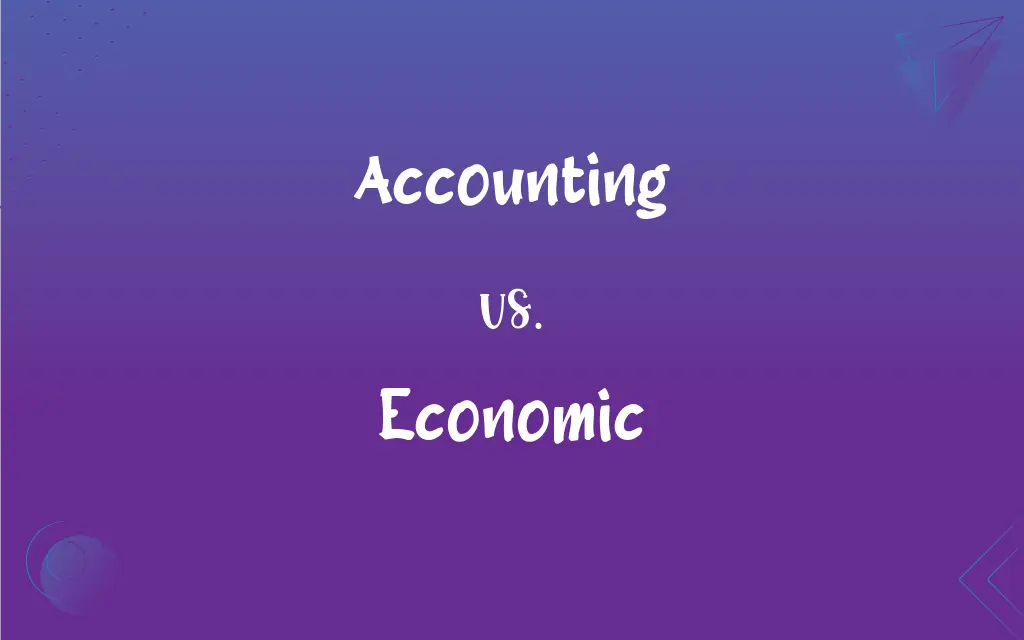Accounting vs. Economic: What's the Difference?
Edited by Janet White || By Harlon Moss || Updated on October 17, 2023
Accounting is the process of recording financial transactions; economic pertains to the production, distribution, and consumption of goods and services.

Key Differences
Accounting is a systematic process that deals with the recording, classifying, summarizing, and interpreting of financial transactions. On the other hand, economic focuses on the broader study of how societies allocate scarce resources to meet the needs and wants of their citizens.
Accounting involves the detailed tracking of monetary inflows and outflows within an organization or individual's financial records. Economic, however, delves into understanding the fundamental forces that drive demand, supply, prices, and the overall behavior of consumers and producers in the market.
The main purpose of accounting is to provide a clear and accurate financial picture of an entity, aiding decision-making. In contrast, economic studies and predicts market trends, guiding policymakers in framing regulations.
Accounting is generally more specific and numbers-oriented, economic offers a macro perspective, analyzing the interconnectedness of various market factors.
Comparison Chart
Scope
Records and analyzes financial transactions of an entity.
Studies the allocation of scarce resources in societies.
ADVERTISEMENT
Primary Focus
Monetary transactions.
Production, distribution, and consumption of goods and services.
Main Purpose
Provide a clear financial picture for decision-making.
Understand and predict market behavior and trends.
Nature
More specific and numbers-oriented.
Macro perspective; analyses interconnected market factors.
Application
Used by businesses and individuals for financial clarity.
Used by policymakers, researchers, and educators to guide decisions.
Accounting and Economic Definitions
Accounting
The practice of analyzing and interpreting financial data.
The CEO relied on accounting insights to make informed decisions.
ADVERTISEMENT
Economic
Concerned with the management of resources and scarcity.
Water scarcity led to significant economic challenges in the region.
Accounting
The process of summarizing financial information for reports.
Accounting reports helped stakeholders understand the company's profitability.
Economic
Pertaining to the production, distribution, and consumption of goods and services.
The economic policies of a country influence its trade relations.
Accounting
The systematic recording of financial transactions.
Jane majored in accounting to understand the financial workings of a business.
Economic
Related to the principles that govern the wealth of nations or communities.
The economic growth rate is a vital indicator of a nation's prosperity.
Accounting
The art of ensuring financial compliance and accuracy.
Due to strict accounting standards, the company faced fewer audit issues.
Economic
Descriptive of the systematic study of economies or economic phenomena.
Economic research helps policymakers frame effective strategies.
Accounting
A field focused on the preparation of financial statements.
With proper accounting, the firm presented transparent balance sheets to its investors.
Economic
Referring to the financial aspects of something.
The economic benefits of the project were immediately apparent.
Accounting
The practice or profession of maintaining the financial records of a business, including bookkeeping as well as the preparation of statements concerning the assets, liabilities, and operating results.
Economic
Of or relating to the production, development, and management of material wealth, as of a country, household, or business enterprise.
Accounting
Present participle of account
Economic
Of or relating to an economy
A period of sustained economic growth.
FAQs
Is economic only about money?
No, economic covers a broad spectrum, including production, distribution, consumption, and the behavior of market entities.
Who typically uses accounting information?
Business owners, investors, creditors, and regulatory agencies use accounting information.
What is the primary goal of accounting?
Accounting aims to provide a clear and accurate financial picture of an entity.
Can economic predictions always be trusted?
Economic predictions are based on data and models, but unforeseen factors can influence outcomes, so they aren't infallible.
What are some common economic challenges?
Inflation, unemployment, and income disparity are common economic challenges.
Can economic theories be proven?
Economic theories are based on observations and can be tested, though real-world complexities can make definitive proof challenging.
How do economic policies influence businesses?
Economic policies shape the business environment, influencing costs, demand, supply, and overall market dynamics.
How does accounting benefit businesses?
Accounting offers businesses insight into their financial health, aiding in decision-making.
How does economic affect daily life?
Economic principles influence prices, employment, production, and overall well-being in society.
How does accounting ensure transparency?
Accounting adheres to standards and guidelines, ensuring financial clarity and honesty.
How do economic indicators benefit investors?
Economic indicators provide insights into market health, helping investors make informed decisions.
Are economic principles universally applicable?
While many economic principles are broadly applicable, regional variations and conditions can influence outcomes.
Can accounting be considered a part of economic?
While accounting and economic are distinct, accounting can be viewed as a subset dealing specifically with financial data.
What software tools are common in accounting?
Tools like QuickBooks, Tally, and SAP are popular in the accounting world.
What's a key ethical principle in accounting?
Integrity is a cornerstone in accounting, ensuring truthful and unbiased financial reporting.
What does economic study?
Economic studies how societies allocate scarce resources to satisfy needs and wants.
Do all businesses need formal accounting?
While all businesses benefit from accounting, the scale and formality depend on the business size and regulatory requirements.
How has technology impacted accounting?
Technology has streamlined accounting processes, enhanced accuracy, and allowed real-time data analysis.
Is accounting only about numbers?
While accounting heavily involves numbers, it also includes analysis, interpretation, and compliance.
Why is economic research important for policymakers?
Economic research offers insights into market behavior, guiding effective policy formulation.
About Author
Written by
Harlon MossHarlon is a seasoned quality moderator and accomplished content writer for Difference Wiki. An alumnus of the prestigious University of California, he earned his degree in Computer Science. Leveraging his academic background, Harlon brings a meticulous and informed perspective to his work, ensuring content accuracy and excellence.
Edited by
Janet WhiteJanet White has been an esteemed writer and blogger for Difference Wiki. Holding a Master's degree in Science and Medical Journalism from the prestigious Boston University, she has consistently demonstrated her expertise and passion for her field. When she's not immersed in her work, Janet relishes her time exercising, delving into a good book, and cherishing moments with friends and family.































































